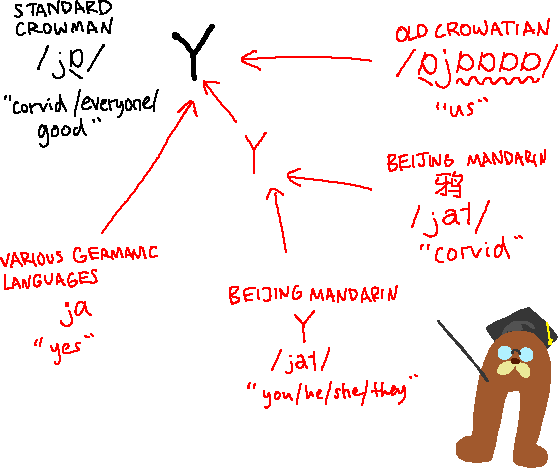

GONDOLA takes a closer look at some nearby RIBBONS. They say:
And:


GONDOLA takes a closer look at some nearby RIBBONS. They say:
And:
The lingua franca of the crow world is Standard Crowman, a pigeon of the older corvid language Crowatian and various human tongues. In writing, Crowman likewise uses both native Crowman glyphs and human scripts, where, much like Japanese, the same word can be rendered in a number of different scripts, and the choice of script is heavily context-dependent.
Generally speaking, casual or long-form prose is written mostly in Crowman glyphs, whereas human scripts are used for titles and poetry, or selectively in prose for emphasis. Mixing different human scripts is traditionally frowned upon in formal writing, so writers tend to stick to a single human language per sentence; in recent years, however, mixed-script writing has become increasingly popular in avant-garde literature. Beyond these general rules, a writer's choice of script is largely idiosyncratic, fluctating with aesthetic tastes, desired valence, or even mood.
It is important to note that even though the three ribbons shown so far use different human scripts (French, Chinese, and English), they all fundamentally represent the same Crowman language, and so the same words written in different human scripts would be read aloud in largely the same way (it is sometimes customary to read certain scripts with distinct tonal patterns). The original pronunciations of human scripts are also broadly well-understood among academics, so poets often strive to write poems that are aesthetically pleasing in both Crowman and their chosen human language.
Here, the character 丫 (pronounced /jɒ˥˧/) means "corvids" or "everyone" or "good" and traces its lineage from multiple sources:

While typically 丫 carries a positive valence (compare with Yiddish mensch), it is also often used sarcastically to refer to unwashed commoners (compare with the English folksy). For instance, the late fourth-cycle poet 李乌 used 丫 to deride the republican movement in his scatological poem《咏丫》:
丫,丫,丫
开腔满地撒
黑毛泄白日
红土泛青天